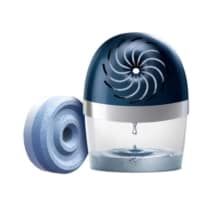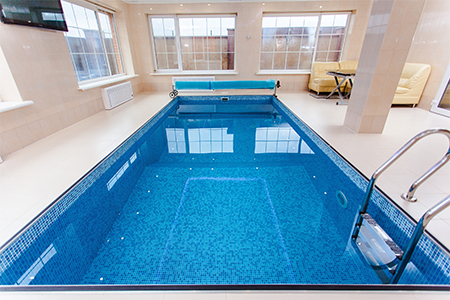
Which dehumidifier to choose for the indoor swimming pool?
Having an indoor swimming pool, under a closed veranda or under cover is the best solution for enjoying swimming all year round. These are often aquatic spaces, with all decoration designed to make this place a pleasant and friendly place. But the other side of the coin is that humidity can quickly take over the premises if you are not careful. It is therefore necessary to choose a strategy and know how to limit the condensation of an indoor swimming pool. For this, the dehumidifier is the most effective “weapon”.
Why not a chemical dehumidifier?

What is a chemical dehumidifier?
The chemical dehumidifier is a tank in which silica gel, sodium chloride or calcium sucks humidity from the ambient air and transforms it into water. The tank must be emptied regularly because the dehumidification capacity is on average 1 to 3 liters per refill. The silica block should be changed every 3 weeks and up to 3 months depending on the humidity level in the room.
What are the pros and cons of chemical dehumidifier?
Easy to use, absolutely silent, it is effective in absorbing humidity in a living room such as the bathroom, bedroom, kitchen, etc. But its action remains limited and unsuitable for a bathroom accommodating a swimming pool or spa. These places are permanently doomed to a high level of humidity.
No electricity consumption, however, it will cost around 250 euros per year for the purchase of recharges.
Whatever the humidity level in the room, impossible to adjust the humidity level.
Electric swimming pool dehumidifier

Why choose an electric dehumidifier for the indoor pool?
The dehumidifier is a large capacity electric humidity absorber, adapted to this rather aggressive environment and the often imposing volume to be treated that is the indoor swimming pool. This equipment draws in ambient humidity from the room and rejects drier healthy air.
The dehumidifier is essential if a swimming pool or spa is installed in a closed room because humidity and condensation prevail in these places. You need an effective device to overcome it.
The advantages and disadvantages of the electric swimming pool dehumidifier
Depending on the model, the electric swimming pool dehumidifier can treat and absorb between 10 and 40 liters of water per day. It adapts to the characteristics of the places to be treated.
It makes it possible to regulate a constant hygrometry rate essential to the well-being of bathers and the sustainability of the building.
It stores the moisture collected in a tray or tank that sometimes needs to be emptied. But very often, and generally, this type of device is equipped with a connection pipe and sends the water to the waste water tank of the house.
Most often, the dehumidifier is presented under shape of a classic or modern console which sits on the floor or attaches to the wall, therefore easy to install. However, when the dehumidifier is built-in or ducted, it is necessary to carry out work.
It is more expensive than the chemical dehumidifier, but it is “autonomous” and requires almost no intervention.
You have understood, if the chemical dehumidifier is recommended for classic rooms of the house, cellar, laundry room... its action is ineffective for a room intended for a swimming pool. The installation of an electric dehumidifier is essential to guarantee the health of this very specific body of water which accommodates a spa or swimming pool. It is the ideal ally for the comfort of swimmers.
Knowing what the conditions are for controlling condensation will allow you to understand the different possibilities for effectively combating this phenomenon which is created in the space of the indoor swimming pool. If it is possible to limit condensation with swimming pool covers and to limit condensation in the covered swimming pool by ventilation, combating condensation using a swimming pool dehumidifier remains the most appropriate means. Find out if it is better to choose a swimming pool dehumidifier or Controlled Mechanical Ventilation to correctly choose the system best suited to your installation.